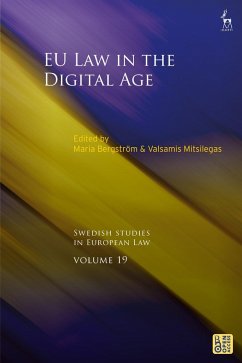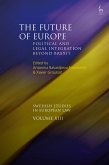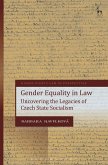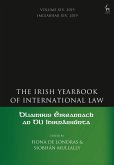EU Law in the Digital Age
Herausgeber: Bergström, Maria; Mitsilegas, Valsamis
EU Law in the Digital Age
Herausgeber: Bergström, Maria; Mitsilegas, Valsamis
- Gebundenes Buch
- Merkliste
- Auf die Merkliste
- Bewerten Bewerten
- Teilen
- Produkt teilen
- Produkterinnerung
- Produkterinnerung
In this book, expert lawyers from across the full spectrum of EU law explore the impact of the digital age on the Union's legal framework. The fifth industrial revolution is impacting on all aspects of society. This open access collection looks at how the European Union and its legal framework is reacting, responding, and evolving to best accommodate the reality of this new environment. Drawn from the insightful and thought-provoking views of acknowledged experts in the field, it examines the questions from all aspects of EU law. This is a thoughtful and timely collection on a question that…mehr
Andere Kunden interessierten sich auch für
![The Future of Europe The Future of Europe]() The Future of Europe54,99 €
The Future of Europe54,99 €![Swedish Perspectives on Private Law Europeanisation Swedish Perspectives on Private Law Europeanisation]() Swedish Perspectives on Private Law Europeanisation40,99 €
Swedish Perspectives on Private Law Europeanisation40,99 €![The Recovery of Maintenance in the EU and Worldwide The Recovery of Maintenance in the EU and Worldwide]() The Recovery of Maintenance in the EU and Worldwide72,99 €
The Recovery of Maintenance in the EU and Worldwide72,99 €![Labour Law, Fundamental Rights and Social Europe Labour Law, Fundamental Rights and Social Europe]() Labour Law, Fundamental Rights and Social Europe120,99 €
Labour Law, Fundamental Rights and Social Europe120,99 €![Gender Equality in Law Uncovering the Legacies of Czech State Socialism Gender Equality in Law Uncovering the Legacies of Czech State Socialism]() Barbara HavelkovaGender Equality in Law Uncovering the Legacies of Czech State Socialism54,99 €
Barbara HavelkovaGender Equality in Law Uncovering the Legacies of Czech State Socialism54,99 €![The Irish Yearbook of International Law, Volume 14, 2019 The Irish Yearbook of International Law, Volume 14, 2019]() The Irish Yearbook of International Law, Volume 14, 2019110,99 €
The Irish Yearbook of International Law, Volume 14, 2019110,99 €![The Transformation of Economic Law The Transformation of Economic Law]() The Transformation of Economic Law66,99 €
The Transformation of Economic Law66,99 €-
-
-
In this book, expert lawyers from across the full spectrum of EU law explore the impact of the digital age on the Union's legal framework. The fifth industrial revolution is impacting on all aspects of society. This open access collection looks at how the European Union and its legal framework is reacting, responding, and evolving to best accommodate the reality of this new environment. Drawn from the insightful and thought-provoking views of acknowledged experts in the field, it examines the questions from all aspects of EU law. This is a thoughtful and timely collection on a question that will continue to dominate EU law in the coming years. The ebook editions of this book are available open access under a CC BY-NC-ND 4.0 licence on bloomsburycollections.com. Open access was funded by the Swedish Studies Network.
Produktdetails
- Produktdetails
- Swedish Studies in European Law
- Verlag: Bloomsbury Publishing PLC
- Seitenzahl: 410
- Erscheinungstermin: 20. Februar 2025
- Englisch
- Abmessung: 240mm x 161mm x 27mm
- Gewicht: 772g
- ISBN-13: 9781509981182
- ISBN-10: 1509981187
- Artikelnr.: 71821222
- Herstellerkennzeichnung
- Libri GmbH
- Europaallee 1
- 36244 Bad Hersfeld
- gpsr@libri.de
- Swedish Studies in European Law
- Verlag: Bloomsbury Publishing PLC
- Seitenzahl: 410
- Erscheinungstermin: 20. Februar 2025
- Englisch
- Abmessung: 240mm x 161mm x 27mm
- Gewicht: 772g
- ISBN-13: 9781509981182
- ISBN-10: 1509981187
- Artikelnr.: 71821222
- Herstellerkennzeichnung
- Libri GmbH
- Europaallee 1
- 36244 Bad Hersfeld
- gpsr@libri.de
Maria Bergström is Associate Professor of European Law and Senior Lecturer in EU Law at Uppsala University, Sweden. Valsamis Mitsilegas is Professor of European and Global Law and Dean of the School of Law and Social Justice at the University of Liverpool, UK.
Foreword: Key Developments in EU Law and the Role of the EU Court of
Justice, AG Maciej Szpunar (Court of Justice of the European Union)
1. Introduction, Maria Bergström (Uppsala University) and Valsamis
Mitsilegas (University of Liverpool)
Part One: AI General - What are the Challenges and Initiatives of AI?
2. AI and Justice - from Policy to Practice, Gösta Petri (European
Commission)
3. Council of Europe Initiatives on Artificial Intelligence with Special
Focus on the Right to Privacy and Data Protection, Peter Kimpian (Council
of Europe)
4. The Challenges of AI: A Mapping Exercise, Karine Caunes (CAIDP, Center
for AI and Digital Policy)
Part Two: Digital Data, Trust and Fundamental Rights in the Internal Market
Context
5. The EU's Digital Package: Striking a Balance for Fundamental Rights in
the Proposed DSA and DMA Regulations, Annegret Engel and Xavier Groussot
(Lund University)
6. Product Liability in the Future Framework of AI (Technology) Regulation,
Béatrice Schütte (University of Helsinki)
7. Defining Risk and Promoting Trust in AI Systems, Johanna Chamberlain and
Andreas Kotsios (Uppsala University)
8. The Proposed Anti-Money Laundering Authority and the Future of FIU
Collaboration in Europe, Eleni Kosta (TILT/Tilburg University)
Part Three: AI and Criminal Justice
9. Algorithmic Predictions, Justice and Privacy, Yulia Razmetaeva (Yaroslav
Mudryi National Law University, Kharkiv)
10. Artificial Intelligence in Criminal Justice: Strengthening or
Challenging the Rule of Law?, Emmanouil Billis (Max Planck Institute for
the Study of Crime, Security and Law)
11. Using AI Systems in the Promotion of EU Defence Rights: The
CrossJustice Project, Michele Caianiello (University of Bologna)
12. The Challenges of Deepfake Technology in the Context of Political
Disinformation, Clementina Salvi (Queen Mary University of London)
13. The UK's Strategy on AI - Implications for English Criminal Law, Rudi
Fortson (KC; Visiting Professor Queen Mary University of London; and
Honorary Visiting Professor of Law at the University of Liverpool)
Part Four: AI and Evidence
14. AI Evidence: Ensuring a Fair Trial in the Digital World, Katalin Ligeti
(University of Luxembourg)
15. AI-Based Means of Evidence and the Defendant's Rights in the European
Union, Eftychia Bampasika (LL.M., Attorney at Law)
16. Transborder Access to e-Evidence - Data Protection Concerns under the
e-Evidence Regulation, Teresa Quintel (European Parliament) and David Cole
(University of Luxembourg)
Part Five: AI and Migration, Databases and Mobility
17. The Traveller and the Digital Border, Elsbeth Guild (Queen Mary
University of London)
18. Towards Artificially Intelligent EU Migration, Asylum and Border
Management? The AI Act, Interoperable Large-Scale IT Systems and the Role
of Agencies, Niovi Vavoula (University of Luxembourg)
19. The Digital Border and the Rule of Law. Lessons from the Establishment
of the European Travel Information and Authorisation System (ETIAS),
Valsamis Mitsilegas (University of Liverpool)
20. Digital Controls, Mobility and Surveillance; the Social Universe of
"Reasonable Suspicion" and Its Different Guilds, Didier Bigo (Sciences Po
and King's College London)
Justice, AG Maciej Szpunar (Court of Justice of the European Union)
1. Introduction, Maria Bergström (Uppsala University) and Valsamis
Mitsilegas (University of Liverpool)
Part One: AI General - What are the Challenges and Initiatives of AI?
2. AI and Justice - from Policy to Practice, Gösta Petri (European
Commission)
3. Council of Europe Initiatives on Artificial Intelligence with Special
Focus on the Right to Privacy and Data Protection, Peter Kimpian (Council
of Europe)
4. The Challenges of AI: A Mapping Exercise, Karine Caunes (CAIDP, Center
for AI and Digital Policy)
Part Two: Digital Data, Trust and Fundamental Rights in the Internal Market
Context
5. The EU's Digital Package: Striking a Balance for Fundamental Rights in
the Proposed DSA and DMA Regulations, Annegret Engel and Xavier Groussot
(Lund University)
6. Product Liability in the Future Framework of AI (Technology) Regulation,
Béatrice Schütte (University of Helsinki)
7. Defining Risk and Promoting Trust in AI Systems, Johanna Chamberlain and
Andreas Kotsios (Uppsala University)
8. The Proposed Anti-Money Laundering Authority and the Future of FIU
Collaboration in Europe, Eleni Kosta (TILT/Tilburg University)
Part Three: AI and Criminal Justice
9. Algorithmic Predictions, Justice and Privacy, Yulia Razmetaeva (Yaroslav
Mudryi National Law University, Kharkiv)
10. Artificial Intelligence in Criminal Justice: Strengthening or
Challenging the Rule of Law?, Emmanouil Billis (Max Planck Institute for
the Study of Crime, Security and Law)
11. Using AI Systems in the Promotion of EU Defence Rights: The
CrossJustice Project, Michele Caianiello (University of Bologna)
12. The Challenges of Deepfake Technology in the Context of Political
Disinformation, Clementina Salvi (Queen Mary University of London)
13. The UK's Strategy on AI - Implications for English Criminal Law, Rudi
Fortson (KC; Visiting Professor Queen Mary University of London; and
Honorary Visiting Professor of Law at the University of Liverpool)
Part Four: AI and Evidence
14. AI Evidence: Ensuring a Fair Trial in the Digital World, Katalin Ligeti
(University of Luxembourg)
15. AI-Based Means of Evidence and the Defendant's Rights in the European
Union, Eftychia Bampasika (LL.M., Attorney at Law)
16. Transborder Access to e-Evidence - Data Protection Concerns under the
e-Evidence Regulation, Teresa Quintel (European Parliament) and David Cole
(University of Luxembourg)
Part Five: AI and Migration, Databases and Mobility
17. The Traveller and the Digital Border, Elsbeth Guild (Queen Mary
University of London)
18. Towards Artificially Intelligent EU Migration, Asylum and Border
Management? The AI Act, Interoperable Large-Scale IT Systems and the Role
of Agencies, Niovi Vavoula (University of Luxembourg)
19. The Digital Border and the Rule of Law. Lessons from the Establishment
of the European Travel Information and Authorisation System (ETIAS),
Valsamis Mitsilegas (University of Liverpool)
20. Digital Controls, Mobility and Surveillance; the Social Universe of
"Reasonable Suspicion" and Its Different Guilds, Didier Bigo (Sciences Po
and King's College London)
Foreword: Key Developments in EU Law and the Role of the EU Court of
Justice, AG Maciej Szpunar (Court of Justice of the European Union)
1. Introduction, Maria Bergström (Uppsala University) and Valsamis
Mitsilegas (University of Liverpool)
Part One: AI General - What are the Challenges and Initiatives of AI?
2. AI and Justice - from Policy to Practice, Gösta Petri (European
Commission)
3. Council of Europe Initiatives on Artificial Intelligence with Special
Focus on the Right to Privacy and Data Protection, Peter Kimpian (Council
of Europe)
4. The Challenges of AI: A Mapping Exercise, Karine Caunes (CAIDP, Center
for AI and Digital Policy)
Part Two: Digital Data, Trust and Fundamental Rights in the Internal Market
Context
5. The EU's Digital Package: Striking a Balance for Fundamental Rights in
the Proposed DSA and DMA Regulations, Annegret Engel and Xavier Groussot
(Lund University)
6. Product Liability in the Future Framework of AI (Technology) Regulation,
Béatrice Schütte (University of Helsinki)
7. Defining Risk and Promoting Trust in AI Systems, Johanna Chamberlain and
Andreas Kotsios (Uppsala University)
8. The Proposed Anti-Money Laundering Authority and the Future of FIU
Collaboration in Europe, Eleni Kosta (TILT/Tilburg University)
Part Three: AI and Criminal Justice
9. Algorithmic Predictions, Justice and Privacy, Yulia Razmetaeva (Yaroslav
Mudryi National Law University, Kharkiv)
10. Artificial Intelligence in Criminal Justice: Strengthening or
Challenging the Rule of Law?, Emmanouil Billis (Max Planck Institute for
the Study of Crime, Security and Law)
11. Using AI Systems in the Promotion of EU Defence Rights: The
CrossJustice Project, Michele Caianiello (University of Bologna)
12. The Challenges of Deepfake Technology in the Context of Political
Disinformation, Clementina Salvi (Queen Mary University of London)
13. The UK's Strategy on AI - Implications for English Criminal Law, Rudi
Fortson (KC; Visiting Professor Queen Mary University of London; and
Honorary Visiting Professor of Law at the University of Liverpool)
Part Four: AI and Evidence
14. AI Evidence: Ensuring a Fair Trial in the Digital World, Katalin Ligeti
(University of Luxembourg)
15. AI-Based Means of Evidence and the Defendant's Rights in the European
Union, Eftychia Bampasika (LL.M., Attorney at Law)
16. Transborder Access to e-Evidence - Data Protection Concerns under the
e-Evidence Regulation, Teresa Quintel (European Parliament) and David Cole
(University of Luxembourg)
Part Five: AI and Migration, Databases and Mobility
17. The Traveller and the Digital Border, Elsbeth Guild (Queen Mary
University of London)
18. Towards Artificially Intelligent EU Migration, Asylum and Border
Management? The AI Act, Interoperable Large-Scale IT Systems and the Role
of Agencies, Niovi Vavoula (University of Luxembourg)
19. The Digital Border and the Rule of Law. Lessons from the Establishment
of the European Travel Information and Authorisation System (ETIAS),
Valsamis Mitsilegas (University of Liverpool)
20. Digital Controls, Mobility and Surveillance; the Social Universe of
"Reasonable Suspicion" and Its Different Guilds, Didier Bigo (Sciences Po
and King's College London)
Justice, AG Maciej Szpunar (Court of Justice of the European Union)
1. Introduction, Maria Bergström (Uppsala University) and Valsamis
Mitsilegas (University of Liverpool)
Part One: AI General - What are the Challenges and Initiatives of AI?
2. AI and Justice - from Policy to Practice, Gösta Petri (European
Commission)
3. Council of Europe Initiatives on Artificial Intelligence with Special
Focus on the Right to Privacy and Data Protection, Peter Kimpian (Council
of Europe)
4. The Challenges of AI: A Mapping Exercise, Karine Caunes (CAIDP, Center
for AI and Digital Policy)
Part Two: Digital Data, Trust and Fundamental Rights in the Internal Market
Context
5. The EU's Digital Package: Striking a Balance for Fundamental Rights in
the Proposed DSA and DMA Regulations, Annegret Engel and Xavier Groussot
(Lund University)
6. Product Liability in the Future Framework of AI (Technology) Regulation,
Béatrice Schütte (University of Helsinki)
7. Defining Risk and Promoting Trust in AI Systems, Johanna Chamberlain and
Andreas Kotsios (Uppsala University)
8. The Proposed Anti-Money Laundering Authority and the Future of FIU
Collaboration in Europe, Eleni Kosta (TILT/Tilburg University)
Part Three: AI and Criminal Justice
9. Algorithmic Predictions, Justice and Privacy, Yulia Razmetaeva (Yaroslav
Mudryi National Law University, Kharkiv)
10. Artificial Intelligence in Criminal Justice: Strengthening or
Challenging the Rule of Law?, Emmanouil Billis (Max Planck Institute for
the Study of Crime, Security and Law)
11. Using AI Systems in the Promotion of EU Defence Rights: The
CrossJustice Project, Michele Caianiello (University of Bologna)
12. The Challenges of Deepfake Technology in the Context of Political
Disinformation, Clementina Salvi (Queen Mary University of London)
13. The UK's Strategy on AI - Implications for English Criminal Law, Rudi
Fortson (KC; Visiting Professor Queen Mary University of London; and
Honorary Visiting Professor of Law at the University of Liverpool)
Part Four: AI and Evidence
14. AI Evidence: Ensuring a Fair Trial in the Digital World, Katalin Ligeti
(University of Luxembourg)
15. AI-Based Means of Evidence and the Defendant's Rights in the European
Union, Eftychia Bampasika (LL.M., Attorney at Law)
16. Transborder Access to e-Evidence - Data Protection Concerns under the
e-Evidence Regulation, Teresa Quintel (European Parliament) and David Cole
(University of Luxembourg)
Part Five: AI and Migration, Databases and Mobility
17. The Traveller and the Digital Border, Elsbeth Guild (Queen Mary
University of London)
18. Towards Artificially Intelligent EU Migration, Asylum and Border
Management? The AI Act, Interoperable Large-Scale IT Systems and the Role
of Agencies, Niovi Vavoula (University of Luxembourg)
19. The Digital Border and the Rule of Law. Lessons from the Establishment
of the European Travel Information and Authorisation System (ETIAS),
Valsamis Mitsilegas (University of Liverpool)
20. Digital Controls, Mobility and Surveillance; the Social Universe of
"Reasonable Suspicion" and Its Different Guilds, Didier Bigo (Sciences Po
and King's College London)








